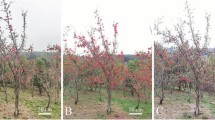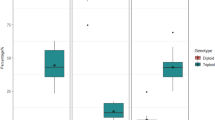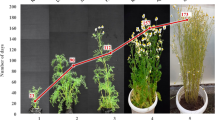Abstract
IN many crosses plant-breeders are confronted with one or more of the following problems : (1) the pollen grains may fail to germinate on a foreign stigma ; (2) if they germinate, the pollen tubes may remain short and burst during their passage ; (3) even if the tubes grow successfully, their progress may be so slow that the ovary becomes abscissed before they reach the ovules.
This is a preview of subscription content, access via your institution
Access options
Subscribe to this journal
Receive 51 print issues and online access
$199.00 per year
only $3.90 per issue
Buy this article
- Purchase on Springer Link
- Instant access to full article PDF
Prices may be subject to local taxes which are calculated during checkout
Similar content being viewed by others
References
See Maheshwari, P., “An Introduction to the Embryology of Angiosperms” (1950).
Cappelletti, C., Nuovo Gior. Bot. Ital., N.S., 44, 613 (1937).
Bosio, M. G., Nuovo Gior. Bot. Ital., 47, 591 (1940).
Author information
Authors and Affiliations
Rights and permissions
About this article
Cite this article
KANTA, K. Intra-ovarian Pollination in Papaver rhoeas L.. Nature 188, 683–684 (1960). https://doi.org/10.1038/188683a0
Issue Date:
DOI: https://doi.org/10.1038/188683a0
This article is cited by
-
Studies on the possibility of transferring the self-compatibility complex of self-compatibleSolanum species to self-incompatible diploid breeding stocks. 1.S. polyadenium as the source of self-compatibility
Potato Research (1976)
-
Test tube fertilization inDianthus caryophyllus Linn
Die Naturwissenschaften (1965)
-
Test-Tube Fertilization in a Flowering Plant
Nature (1962)
-
Intra-ovarian Pollination in Eschscholzia Californica Cham., Argemone mexicana L. and A. ochroleuca Sweet
Nature (1961)
Comments
By submitting a comment you agree to abide by our Terms and Community Guidelines. If you find something abusive or that does not comply with our terms or guidelines please flag it as inappropriate.



